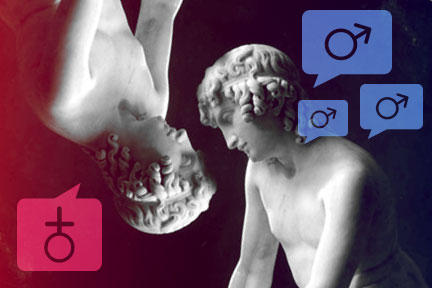A study suggests that men tend to be more narcissistic than women, a trait often demonstrated those in leadership roles.
by Aparna Vidyasagar
illustration by Grace Molteni
The word ‘narcissist’ derives from “Narcissus”, the name of a man so taken with his own watery reflection that he drowned while gazing intently upon it. This masculine origin is especially fitting, given the findings of a recent research study.
A research team of psychology, business, and management experts led by Emily Grijalva of the University at Buffalo School of Management, conducted a meta-analysis of data from 31 years of narcissism research in the United States The authors scoured various research databases for any mention of the keywords “narcissism, narcissist, narcissistic, gender, sex, male and female.” As a result, 360 journal articles, dissertations, unpublished manuscripts and technical manuals, were included in the analysis. The conclusion: men tend to be more narcissistic than women.
The authors found this to be true even when they compared different age groups of men and women, as well as different generations. Male college students from 1990 to 2013 have continued to be more narcissistic than their female peers (though neither group has gotten more narcissistic over time). But when the authors broke narcissism down into three sets of key traits or “facets”— entitlement and exploitative characteristics, leadership and authority, grandiosity and exhibitionism — the results got interesting, and potentially provided an explanation for why there are fewer women in senior leadership roles.
These facets are defined in the Narcissistic Personality Inventory (NPI), a questionnaire that is used to measure narcissism. The current study found that men tended to be more exploitative and entitled than women. The authors mention aggression, harassment of co-workers, and cheating on tasks as behaviors associated with this facet of narcissism. Men also tended to be more motivated than women to take on leadership roles and they coveted authority and power. However, men scored only slightly higher when it came to the facet of grandiosity and exhibitionism. According to the study, “vanity, self-absorption, superiority, and exhibitionistic tendencies” are qualities associated with this particular category.
The authors describe narcissism as existing on a spectrum. At its worst, narcissistic traits manifest as “narcissistic personality disorder” (NPD). Yet milder versions of these same traits can have both good and bad effects. While a narcissist can be aggressive, and have trouble maintaining healthy personal relationships, he or she can also have high self-esteem and stable emotions. This, they say, is why narcissists are often seen in leadership roles. The differences between men and women when it comes to narcissism, especially in the entitlement, leadership and authority facets, might also explain why women aren’t often seen in senior leadership. According to the study, while women in the United States make up just a shade over half the population of managers, they also make up less than 20 percent of CEOs and Fortune 500 board members. Moreover, less than 10 percent of the top-earners in Fortune 500 companies are women. The authors of the study also believe that the situation is further complicated by gender stereotypes, stating, “A potential outcome of gender role beliefs is how they affect (and perhaps limit) individuals’ understandings of their own competencies, likes, and dislikes.”
“Individuals tend to observe and learn gender roles from a young age, and may face backlash for deviating from society’s expectations,” said Grijalva in a press release about the study. “In particular, women often receive harsh criticism for being aggressive or authoritative, which creates pressure for women, more so than for men, to suppress displays of narcissistic behavior.”
If you want to see just how narcissistic you are, TIME magazine published the Narcissistic Personality Inventory (NPI) as an interactive quiz.
[hr style=”striped”]
Aparna Vidyasagar is a freelance science writer who writes about life-sciences research and health. She lives in Portland, Oregon. Follow her on Twitter @aparnavid.
Grace Molteni is a Midwest born and raised designer, illustrator, and self-proclaimed bibliophile, currently calling Chicago home. For more musings, work, or just to say hey check her out on Instagram or at her personal website.



